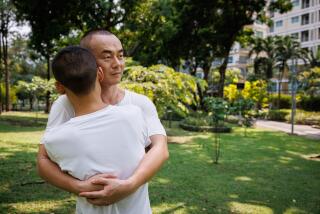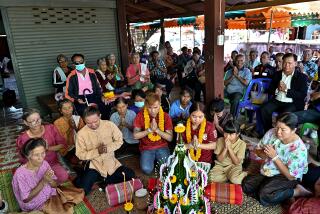Servitude a Fact of Life, Thais Say
- Share via
Early on the morning of Jan. 14, as the rest of the Woodland Hills household slept, the two Thai women hurried quietly out the door to a waiting car. By 7 a.m. they were standing with their luggage in front of the Thai Community Development Center in downtown Los Angeles, waiting for it to open.
They had a story to tell--of alleged enslavement and years of mistreatment at the hands of a Thai-community scion, and it would lead to a federal indictment against the woman they lived with.
The tale swiftly made the rounds in the Los Angeles Thai community, at the Wat Thai temple in North Hollywood, and through the newsrooms of local Thai papers. But six weeks passed before the allegations were printed anywhere and word spread beyond the tightknit and protective Thai community--an example of Thai cultural differences and practices.
Even when they printed the story, some Thai papers still left out the name of the revered and well-heeled woman who was indicted: 52-year-old Supawan “Sonya” Verapol, identified in prosecution documents as the mistress of Thailand’s ambassador to Sweden. She denies all the charges.
Keeping workers in harsh servitude “is not an unusual phenomenon if you understand Thai culture, because class defines everything,” said Chanchanit Martorell, executive director of the Thai center. Supawan “is very well known in the upper, elite Thai community, both here and in Thailand.”
The two women who scrambled out of her posh house before dawn “had to crawl on their knees to serve her,” Chanchanit continued. “They are lower class.”
*
A day after Supawan was indicted on charges of harboring and employing illegal immigrants--and accused in a federal affidavit of misdeeds ranging from forcing the women to work 18 hours a day at her home and restaurant to censoring their letters--the plight of the women had become the talk of the Thai community.
Assistant U.S. Atty. Michael Gennaco said this was “potentially El Monte revisited,” referring to the 1995 case in which more than 70 indentured Thai workers were freed from a garment shop there. He said Thursday that the investigation was continuing.
Many local Thai Americans minimized Gennaco’s comparison to the notorious El Monte case, in which the workers were held for years in prison-like conditions. But, they said, although this case involves far fewer people and carries no allegation of physical restraint, it represents the same type of danger faced by impoverished, lower-class Thais who come to the United States to work as servants, laborers and prostitutes.
“They were living in a vacuum, in isolation,” said Chanchanit, who has met frequently with the two women, who are living in a shelter.
“They didn’t know where to go to, who to turn to. They didn’t even think they could be helped. They might be living in a country with respect for justice . . . but culturally, they were living in a prison without walls.”
Supawan, a fixture in Thai American society circles who attended dinners for visiting Thai dignitaries and frequented the North Hollywood temple, has denied the charges, saying that far from keeping the women in servitude, she financially supported them, took them shopping and considered them good friends.
Although some Thai Americans voiced support Thursday for Supawan--and, according to several sources, a trio of prominent Thais put up the $500,000 bond to keep her out of jail--the community as a whole was not rushing to her defense.
*
Well aware that in Thailand the wealthy often hold servants in harsh conditions, the readers of Santipap, a local Thai-language newspaper, have tended to believe the allegations, said the paper’s editor, Somchet Phayakarit.
“People in the Thai community know that things like this happen,” Somchet said. “When El Monte happened, the reaction was the same. The Thai community is really upset. They know stories like this are not good for the Thai community’s image.”
Others said that it was common knowledge that Supawan had contract-servants working long hours at her home and a Thai restaurant she owned.
Some acquaintances of Supawan said that they had advised her that some practices of high society in Thailand were illegal in the United States.
“I [warned] her,” one acquaintance said. “But she [didn’t] listen.”
The acquaintance, herself the former owner of a Los Angeles Thai restaurant, said she knew the two alleged victims from visiting Supawan at her home.
“They worked so hard,” the acquaintance said. “They worked at the restaurant and the house too, taking care of her children.”
Alex Jour, manager of Pratunum Market, across the street from Wat Thai temple, said Thai people coming to this country--many after signing servitude contracts--often don’t understand their rights.
“It’s not shocking. It’s not the first time,” Jour said. “Still, it’s bad if they paid cheap, but it does depend on the agreement.”
Steve Nilchavee, 43, of Huntington Beach, who came to the temple with his friend, Maria Pinying, 50, said: “It’s like the situation in El Monte.” It was the chief subject of conversation at a party recently, he said, describing the comments as shocked and angry.
Pinying, a Van Nuys resident, said Thai immigrants are willing to work hard for low wages but it is wrong to underpay them.
The agreements between Supawan and the two women differed slightly--one was to earn $200 a month, for example, the other $240--but essentially promised the same thing: Room, board, medical care and other basic necessities and a small salary in exchange for six-day workweeks, according to the affidavit.
The jobs were not going to be easy, but bearable, the contracts indicated.
Despite that agreement, Thonglim Khamphiranon, 42, and Somkhit Yindiphot, 58, told an Immigration and Naturalization Service agent that after they were smuggled into the United States in the early 1990s, Supawan took their passports and visas and forced them to work 18 hours a day, seven days a week.
Thonglim said she had to extract her own infected molar because Supawan refused to take her to a dentist.
They were not allowed to read newspapers, the two alleged, and Supawan censored their letters to loved ones back home.
During an interview in the elaborately furnished house she lives in, Supawan denied each of the allegations.
“It makes me look bad,” Supawan said of the charges. “My family in Thailand is very upset. It gives my family a bad name.”
She accused a business rival, Peter “Joe” Thipp, of encouraging the women to make the allegations.
According to business records and the affidavit, Supawan closed her restaurant, the Gulf of Siam on Ventura Boulevard in Woodland Hills, last summer, and Thipp later opened a new restaurant, the Bangkok Princess, at the same location. Thonglim and Somkhit continued to work in the restaurant.
Soon after opening his restaurant in November, Thipp said Thursday, the women came to him with allegations of mistreatment by Supawan.
“Terrible,” Thipp said. “Every morning they would tell me a story about that lady.”
So they came up with a plan, Thipp said. And on Jan. 14, he parked his car outside Supawan’s home. Supawan was away. Others in the house were asleep. Thonglim and Somkhit appeared, and he drove them away.
Times staff writer Amy Oakes contributed to this story.
More to Read
Sign up for Essential California
The most important California stories and recommendations in your inbox every morning.
You may occasionally receive promotional content from the Los Angeles Times.













